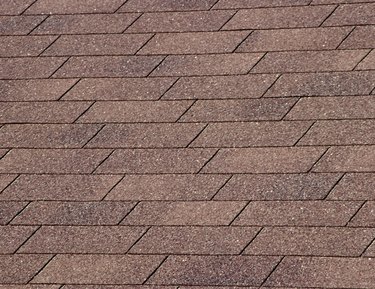
There's nothing worse than discovering a leak in your roof in the middle of winter. This is especially bad news for homeowners who have asphalt tile roofing. The reason is that in order for asphalt to perform at its best, it must form a seal. In order for this to happen, certain conditions, such as temperature, must be met.
Asphalt Tiles
Video of the Day
Asphalt tiles are by far the most economically affordable roofing material. Not only for price, but also for life. In general, asphalt tiles have a 30-year lifespan from the time of manufacturing. The primary reason for this long life is the self-adhesive sealing strip located on the top of each tile piece. This strip forms a permanent barrier with the ceiling underlayment, preventing water and dust from penetrating the shingles. It also prevents wind from lifting the shingles out of place.
Video of the Day
Manufacturer Specifications for Cold
There are two ranges of thought with regard to manufacturer's installation requirements for shingles. The first, and more flexible, is that the outside temperature on the roof must be at least 40 degrees F for 24 consistent hours. The reason for this is that the adhesive strip will not activate and seal the shingle under colder conditions. Colder temperatures leave it open to exposure to dirt and water, which ruins the seal. Other manufacturers will refuse warranty coverage for any work done in cold-weather winter locations. Always check the manufacturer's specifications.
Recommendations for Heat
Similarly, it can be too hot to properly install and seal the shingles. According to most manufacturers, any roof temperatures above 100 degrees F will cause the tiles to become fragile and the sealant to become too soft. While the sealant will still activate, it will not harden immediately. This can result in tiles being inadvertently moved if stepped on or scuffed with tools.
Time and Other Considerations
Curing time for the tile adhesive seal depends on the manufacturer and should be taken into consideration when selecting the season for installation. In general, ceiling tiles take 48 hours to cure after activation of the strips. Additionally, when installing tile, make sure that all of the nails for installation only penetrate the seal area as the sealant will surround the nails and create a water-tight barrier. Nails placed anywhere else can cause leaks.